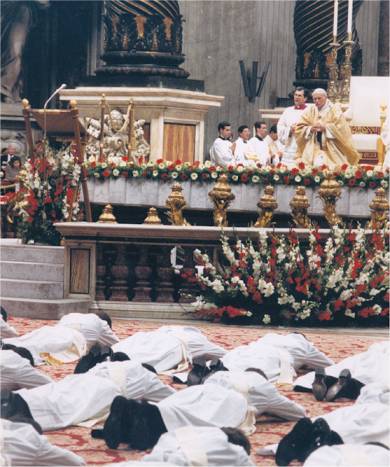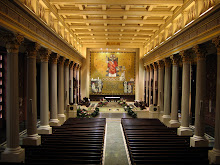While I took 11 pages of typed notes, I only want to highlight a few things that are still fresh in my mind.
He stressed the importance of 'Organic Continuity' in the development of the liturgy. As an illustration of this, he put up a picture of a manual typewriter, an 'electrolux' typewriter (or whatever one of those dinosaur things are!), to the very first mac, through a few iterations to the present day ipad (conveniently enough, on which I was taking notes!). While each one was distinct and unique, one can trace the notion of what is 'typewriter' right through the whole thing. There are four basic principals at work here:
1) the basic identity is preserved throughout.
2) evolving aspects of changing traditions (how has language changed over the last 150 years, heck even 50 years?)
3) Variation must be built upon prior condition (don't throw the whole thing out and start over, ie a 'hermeneutic of continuity.')
4) the received heritage must be recognized and respected.
One example of this 'Organic Development' of the liturgy is in the practice of Communion offered under both species. It was introduced as an indult granted to the US bishops alone after the Council in the general instruction for the US. In the Third Typical Edition, it has found universal application. Something organically developed (with theological argumentation and rationale) in a local church achieved a wider application.
However, he went on to stress that which I think will have the greatest impact for vocations and the life of the faithful: the 'Ars Celebrandi' as the hermeneutical key for interpreting the revised texts of the Roman Liturgy.
Simply, 'Ars Celebrandi' refers to the 'art of celebration,' that which the presider brings to his celebration of the Sacred Mysteries. CAVEAT! What is NOT being said: this isn't looking at the Sacred Liturgy as a mere performance, hardly! Hear me out.
I am continually struck by the number of people who, after Mass, comment on the way I celebrate Mass. After all, it's all in the book, I just try to 'say the red, do the black.' However, to put a bit of emotion, without the celebration becoming contrived, can help the faithful experience what is being celebrated.
In paragraph 93, the General Instruction of the Roman Missal refers to the priest in the following way:
- stands at the head of the faithful
- presides over the community in prayer
- proclaims the message of salvation
- associates the people with himself (hmmm.... notes aren't clear on this one)
- gives the faithful the Bread of Life
- partakes of the Bread of Life with them.
The source for this viewpoint was not created by the General Instruction, but rather derives out of the Second Vatican Council when the Council Fathers are discussing the Salvific Role of Jesus Christ. Hence, the General Instruction is very clear to address that the priest truly does act in the persona Christi, head and priest. It is Christ who must increase, I, as priest, must decrease.
Benedict XVI picks up on these themes when he states (somewhere, I didn't get the reference): 'The texts of the Mass are not theatrical, they are prayers, and I, as priest, use them to talk to God.'
If the GIRM 93 gives a job description for the priest, it also gives an evaluatory program: 'The priest is to serve God and the people with humility and dignity, by his bearing and the way he says the divine words, he must convey to the faithful the living presence of Christ.' The holiness of the priest radiates out towards his people.
The inner call of holiness then manifests itself in the outer acts of the priest. Vatican II's Presbyterum Ordinis, 13: 'When priests join in the act of Christ the Priest, they offer themselves entirely to God.'
If the upcoming reform helps to foster all of this, I see it leading to a great increase in vocations.










1 comment:
Sorry I got some gripes with this"
" 2) evolving aspects of changing traditions (how has language changed over the last 150 years, heck even 50 years?)"
Evolution and change are tenants of Modernism in terms of traditions. Tradition doesn’t evolve it develops.
A language problem wouldn’t exist if we just mandatorily used Latin.
"One example of this 'Organic Development' of the liturgy is in the practice of Communion offered under both species. It was introduced as an indult granted to the US bishops alone after the Council in the general instruction for the US. In the Third Typical Edition, it has found universal application. Something organically developed (with theological argumentation and rationale) in a local church achieved a wider application."
But the counter argument is twofold on this example:
1. The removal of the Blood was a development to fight error, therefore its introduction again is a reverse-development? How is that organic? Organic development is implemented because of customs and traditions from the people; there was no mass cry in the U.S. for reception under both kinds; it was implemented from the top down. Therefore a novelty.
2. Reception under both kinds increases the use of EMHC and thus helps to harm the sense of the Sacred you talked about and also might help to introduce old errors once again.
"In paragraph 93, the General Instruction of the Roman Missal refers to the priest in the following way:
- stands at the head of the faithful
- presides over the community in prayer
- proclaims the message of salvation
- associates the people with himself (hmmm.... notes aren't clear on this one)
- gives the faithful the Bread of Life
- partakes of the Bread of Life with them."
The primary function of the priesthood is to offer Sacrifice. Why was this not listed? It is the most important of them all.
Post a Comment